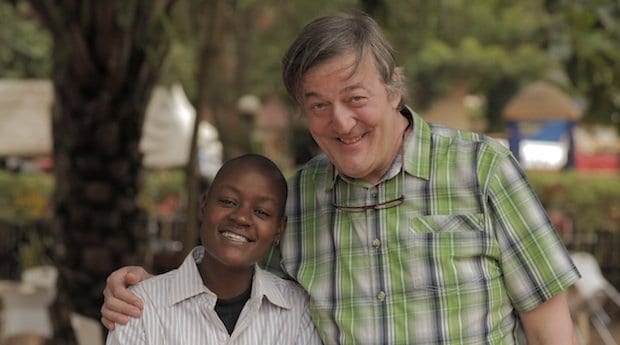It’s no secret that Stephen Fry is an internationally beloved figure. The 57-year-old British wit is known both for his biting social commentary and his love of language. Fry has also been outspoken about mental health, having suffered openly from depression and bipolar disorder for much of his life. Among his contributions to television are the sketch comedy A Bit of Fry & Laurie and the popular BBC quiz show QI.
Fry is also openly gay and, like many in the LGBT community, struggled with his sexuality early in his life. But since coming out he has become a vocal and unapologetic advocate for the gay rights movement. In Out There, a two-part documentary airing this September on TVO, Fry travels around the globe exploring the concept of homophobia, speaking with some of the politicians who have made it their mission to persecute and restrict LGBT people, as well as the individuals their policies have affected.
“There are people who are so rabidly homophobic, and I just find that fascinating,” Fry says at the beginning of the documentary. “It’s as if you met someone who was absolutely — spent all their life trying to get rid of red telephones.”
“Documentaries at TVO are curated with the intent of helping Ontarians become more informed and engaged on the issues that matter,” says John Ferri, vice-president of current affairs and documentaries at TVO, in a statement emailed to Xtra. “With issues around LGBT rights prominently in the media over the past year or so, we felt that Stephen Fry’s look at what it means to be gay in the global community aligned nicely to our objective of informing and engaging Ontarians.”
Fry begins his journey by meeting with Sir Elton John and his partner, David Furnish, talking with them about being out, partnered and the fathers of two young boys. Then, in a stark contrast, he travels to Uganda, where, in a heartbreakingly emotional scene, he meets with a young lesbian who was the victim of a corrective rape that left her pregnant and HIV-positive.
Fry’s travels take him to the United States, where he explores the ex-gay movement, interviewing both a practitioner of the dubious therapy and a gay man who tried to become straight. He also visits Russia, where he meets a family who, just by living their daily lives, are in violation of that country’s anti-homosexual-propaganda law, and Brazil, where a gay person is murdered every 36 hours. In India, he visits the Humsafar Trust, an organization dedicated to providing resources to the LGBT population in Mumbai.
In a video interview on the BBC website, Fry discusses the experience of coming face to face with people deeply and unapologetically homophobic. “I tried as hard as possible, whenever I encountered people of really quite frothing homophobic tendencies who wanted to visit violence and sort of nullification on gay people, I tried to keep quiet, either to laugh or to smile, to allow them to reveal themselves for all the oddity of their prejudice.”
Indeed, some of the most chilling moments in the series come when Fry is face to face with government officials who make no bones about their disdain for the LGBT community.
In one scene, Russian politician Vitaly Milonov, the principal sponsor behind the anti-homosexual-propaganda law, tells Fry that the day-to-day violence and prejudice encountered by the LGBT community are “a fairy tale.” Most of them, he says, are simply lying about their problems. On parting, Fry asks the politician how he sleeps at night, to which Milonov replies, “I can sleep after I pray.”
Stephen Fry: Out There screens on TVO Wed, Sept 10 and 17 at 9pm EST
For more information, visit
tvo.org


 Why you can trust Xtra
Why you can trust Xtra


